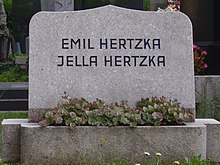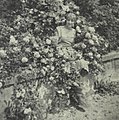Yella Hertzka
Yella Hertzka , also Jella Hertzka , née Yella Fuchs , (born February 4, 1873 in Vienna , Austria-Hungary ; † November 13, 1948 there ) was an Austrian women's rights activist , publisher , gardener and founder of the first higher horticultural school for girls in Austria.
Life
Yella Fuchs was of Jewish descent; her parents were Ferdinand Fuchs and Agnes Fuchs, née Tedesco . She completed an upscale horticultural training at the Rhenish fruit and horticultural school for women in Godesberg .
On May 20, 1897, Yella Fuchs married the Austrian publisher Emil Hertzka , who was director of the Viennese music publisher Universal Edition from 1907 to 1932, in Vienna's main synagogue , the city temple .
In 1912 she founded the first two-year horticultural school for girls in Vienna-Grinzing and directed it until 1938. At this school she taught the subjects of business administration, flower forcing, soil and law. In the 1930s, the school also served to prepare young Zionists for their work in Palestine (" Jugendalija ").
In the park, which was attached to her horticultural school, Yella Hertzka often organized garden festivals, in which personalities of Viennese musical life and internationally known composers such as Darius Milhaud , Gustav Mahler , Arnold Schönberg , Béla Bartók , Zoltán Kodály and Ernst Krenek took part. At her suggestion, the artist colony planned by Josef Hoffmann in Döblinger “Kaasgraben” in Vienna XIX was established in 1912/13 . The Hertzka couple themselves moved there from Gymnasiumstraße 79 in 1913 and lived at Kaasgraben 19, where the boarding school belonging to their horticultural school was also located.
The horticultural school
“She was founded a decade ago by a clever, far-sighted woman, when the mansions with their gardens had long been moved in front of the last houses in the big city, every free space was adorned with public facilities, but least of all women and girls thought about it to create a new profession. Mrs. Yella Hertzka thought of it ... as the first woman in Austria, and today the best families send their daughters to the blooming world of flowers ... "
In 1903, Yella Hertzka supported the establishment of a private high school in Vienna's Cottage Quarter by the Polish educator Salome Goldman . In the Federation of Austrian Women's Associations (BÖFV), Hertzka headed the commission for horticulture and small animal breeding and worked on the agricultural commission until the union was dissolved in 1938. In 1903 she was co-founder of the “New Vienna Women's Club” and from 1909 to 1933 its president , later honorary president. From 1921 until its dissolution in 1933, she was president of the Austrian section of the International Women's League for Peace and Freedom, founded in 1915 . In 1921 she organized the “3. International Congress of the Women's League "in Vienna and in 1929 the" Minorities Conference "of the League, also in Vienna.
After the death of her husband in 1932, Yella Hertzka was a member of the music publisher's supervisory board and was involved in the management of the publisher until Austria was annexed and the company was Aryanized in 1938 . In order to acquire Czechoslovak citizenship , the widow Hertzka married her cousin from Prague , the bookseller Edgar Taussig , on December 30, 1938 , who was murdered in the Theresienstadt concentration camp on May 19, 1943 . With the help of her new citizenship, Yella Hertzka-Taussig was able to flee the National Socialists in early 1939 and went into exile in London until 1946 . There she worked as a gardener and was involved in the British branch of the International Women's League for Peace and Freedom . After her return, she was appointed public administrator of the music publisher Universal Edition in early 1947.
Yella Hertzka died in Vienna in November 1948 and found her final resting place in the Döblinger Friedhof at the side of her first husband Emil Hertzka (Israelite Department; Group I4, Row 3, No. 1A).


In Vienna's Seestadt Aspern district , a resolution of February 28, 2012 by the Vienna City Council Committee for Culture and Science named a 1.6-hectare city park , which was newly laid out in 2014, after Yella Hertzka. The park opened in July 2015.
Honors
- Honorary President of the New Vienna Women's Club
- 2015 Yella-Hertzka-Park in Vienna
exhibition
-
Tracked. Engaged. Married. Marriage of convenience into exile. May to October 2018, Jewish Museum Vienna, Judenplatz location, curators Sabine Bergler, Irene Messinger (therein: Hertzka); brochure
- Catalog: same title, ed. like curators, publisher like exhibitors ISBN 3901398856
literature
- Elisabeth Th. Hilscher-Fritz: Hertzka, married couple. In: Oesterreichisches Musiklexikon . Online edition, Vienna 2002 ff., ISBN 3-7001-3077-5 ; Print edition: Volume 2, Verlag der Österreichischen Akademie der Wissenschaften, Vienna 2003, ISBN 3-7001-3044-9 .
- Felix Czeike (Ed.): Hertzka Jella (Yella). In: Historisches Lexikon Wien . Volume 3, Kremayr & Scheriau, Vienna 1994, ISBN 3-218-00545-0 , pp. 161-162 ( digitized version ).
- Hertzka, J (Y) ella; born Fuchs (1873–1948), school founder and women's rights activist. In: Austrian Biographical Lexicon 1815–1950 (ÖBL). Volume 2, Publishing House of the Austrian Academy of Sciences, Vienna 1959, p. 293 f. (Direct links on p. 293 , p. 294 ).
- Yella Hertzka in the Vienna History Wiki of the City of Vienna
- Corinna Oesch: Yella Hertzka (1873-1948). Networks and spaces for action in the Austrian and international women's movement. Studienverlag, Innsbruck / Vienna 2014, ISBN 978-3-7065-5344-5 .
- Richard Bamberger , Franz Maier-Bruck : Austria Lexicon in two volumes. Volume 1: A-K. Österreichischer Bundesverlag / Vienna [u. a.]: Jugend & Volk, Vienna 1966.
- HH: "The first horticultural school for women in Austria". In: Der Bund 7 (1912) 10, pp. 10-12. On-line
- Ulrike Krippner, Iris Meder: To train reliable gardeners. Vienna's private horticultural schools for women before 1938. In: David 86 (2010). On-line
- Elisabeth Malleier: "Every victory for women must be a victory for freedom, or it is not a victory. Jewish feminists in the Viennese bourgeois women's movement and in international women's movement organizations" . In: Frank Stern, Barbara Eichinger [ed.]: Vienna and the Jewish experience 1900–1938. Acculturation, anti-Semitism, Zionism . Böhlau, Vienna 2009, pp. 277–295.
- Michaela Raggam-Blesch: Women between the fronts. Jewish women in feminist, political and philanthropic movements in Vienna at the turn of the 19th and 20th centuries. In: Margarete Grandner, Edith Saurer [ed.]: Gender, religion and engagement. The Jewish women's movements in the German-speaking area in the 19th and early 20th centuries. Böhlau Vienna 2005, pp. 25–56.
- Ursula Schwarz: The Viennese publishing system of the post-war period: An investigation of the role of public administrators in the denazification and in the restoration of aryanized publishers and bookshops. Vienna, Univ. Vienna, Dipl.-Arb., 2003.
- Reinhard Müller: Some Austrian refugees in Great Britain. On-line
- Hans Morgenstern: Jewish biographical lexicon. A collection of important personalities of Jewish origin from 1800. LIT-Verlag, Vienna 2011, p. 345.
- Yella Hertzka in the database Women in Motion 1848–1938 of the Austrian National Library
- Ernst Hilmar, Otto Brusatti: 75 years of Universal Edition (1901–1976). Catalog for the exhibition of the Vienna City and State Library in the Historical Museum of the City of Vienna. December 1976 / January 1977. Self-published, Vienna 1976.
- Hadwig Kräutler, Corinna Oesch, Günther Sandner: Otto Neurath's 'Encyclopedia of the World War': A Contextualisation. In: Brian McGuinness [ed.]: Friedrich Waismann - causality and logical positivism. Springer, Dordrecht 2011, pp. 267–282,
- Report of the third international congress of women, Vienna, July 10-17, 1921, Women's international league for peace and freedom. Otto Maass Vienna 1921. Online
- Fourth annual report of the New Women's Club 1906–1907. On-line
Web links
Individual evidence
- ↑ a b Corinna Oesch: Yella Hertzka (1873-1948). An auto / biography of relationships . In: Austrian Journal of History , Volume 19, Issue 2, 2008, pp. 118 ff, fedora.phaidra.univie.ac.at, accessed on December 10, 2015
- ↑ a b c d Hertzka, J (Y) ella; born Fuchs (1873-1948), school founder and women's rights activist. In: Austrian Biographical Lexicon 1815–1950 (ÖBL). Volume 2, Publishing House of the Austrian Academy of Sciences, Vienna 1959, p. 293 f. (Direct links on p. 293 , p. 294 ).
- ↑ a b c d Yella Hertzka in the Vienna History Wiki of the City of Vienna
- ↑ Adolph Lehmann 's general housing indicator from 1913, Volume 2, Part 7. Residents of Vienna. P. 468 Herschmann - Herz ( middle column above ) , accessed on October 26, 2018.
- ↑ Adolph Lehmann 's general housing indicator from 1914, Volume 2, Part 7. Residents of Vienna. P. 477 Herschthal - Herz ( middle column above ) , accessed on October 26, 2018.
- ↑ Fred Heller: Miss gardener. In: Die Bühne , year 1926, 3rd year, issue 8, p. 12 (online at ANNO ).
- ↑ Edgar Taussig . In: Joseph Zenker: Pantheon: address book of art and antiques collectors and dealers, libraries, archives, museums, art, antiquity and history associations, book lovers, numismatists, 1914 . Paul Neff Verlag, Eszlingen aN 1914. p. 387, accessed on ancestry.com on December 10, 2015
- ↑ Documents relating to Edgar Taussig ( memento of December 22, 2015 in the Internet Archive ) on holocaust.cz, accessed on December 10, 2015
-
↑ The Yella-Hertzka-Park on wien.gv.at, accessed on December 10, 2015.
Yella-Hertzka-Park in the Vienna History Wiki of the City of Vienna
| personal data | |
|---|---|
| SURNAME | Hertzka, Yella |
| ALTERNATIVE NAMES | Fuchs, Yella (maiden name); Hertzka, Jella; Taussig, Yella; Hertzka-Taussig, Yella; Taussigova, Yella |
| BRIEF DESCRIPTION | Austrian women's rights activist and school founder |
| DATE OF BIRTH | February 4, 1873 |
| PLACE OF BIRTH | Vienna |
| DATE OF DEATH | November 13, 1948 |
| Place of death | Vienna |





